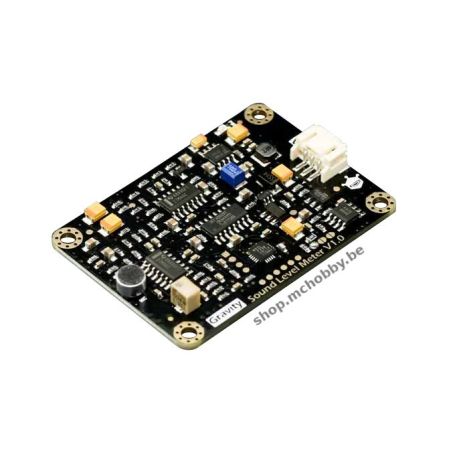Sound level meter (Decibel-meter) - Gravity, Analog output
Noise meter
- 3.3 to 5.0V
- 30 to 130 dB(A)
- Analog output: 0.6 to 2.6V
- Linear conversion (dB A -> volts)
- High precision
- Easy to use
Payments are secured by LyraCollect, a French payment collection company.
It is possible to delivered to your home, to a pick-up point or picked up by appointment at MCHobby
We prepare, pack and ship your orders with great respect and care.
A 30 to 130 dB(A) sound level meter for DIY application with analog output interface
This module measures the sound level also known as a decibel meter or noise meter. This module uses a high quality circuit intended for instrumentation and a low noise microphone, which allows an accurate measurement of the sound level of the surrounding environment. This type of module makes it possible to measure the environmental noise level like that of a motorway, a living room, etc. by making a reading in decibel dB (A) (see note). Having such a sensor in the DIY and makers world is truly an incredible opportunity, this type of material is generally reserved for the professional world.
Nowadays, there is a lot of noise in our sound environment and some of them are really annoying. This module can therefore prove to be very useful for assessing the quality of life of the environment, or even predicting the impact on health (we know that certain sound volumes require the use of protective means!).
The sound volume sensor (or noise meter or decibel meter) is a basic noise measurement instrument, it does just one task but does it well! When DFRobot wanted to launch this product, it wanted it easy to use, easy to plug in and Arduino compatible. This is why this module offers an analog output, that it is part of the Gravity range (easy to connect, solderless) but that it is also compatible with 3.3V logic microcontrollers (like the pyboard).
We thus find a product which can be supplied with 3.3 or 5V, which returns an analog output voltage of between 0.6 and 2.6V (therefore compatible with 3.3V MCUs) and most importantly, a linear output according to the measured decibels (no need for complex formulas and algorithms to use this module).
Gravity connectic facilitate connection to the Gravity IO Shield for Arduino. The Gravity connectic can also be used with breadboard or perfboard thanks to its 2.54mm impaction.
As this sensor also works at 3.3V, it is also possible to use it with a Pyboard, a Raspberry-Pi (via an analog/digital converter) and any other platform in 3.3V logic.
For each order, you will receive the sound level capture module and an analog cable.
What is dB (A)?
It's the measurement of the sound level in decibels with the A Weighting (standard IEC 61672-1) used by electro-acoustic noise meters. This weighting is used for the evaluation of environmental noise and noise/loudness (see also Decibel A on Wikipedia)
Noise/loudness is the sound volume as perceived by humans (acoustic pressure). Loudness is, for example, the volume of a HiFi system, audio device, smartphone, TV. It is a volume indicator.
Loudness makes it possible to address cases such as noise or noise disturbance (sound as noise) but also communication via sound (broadcasting, telephony, spectacle, communication instruments, ...).
Technical details
- Measuring Range: 30dBA à 130dBA
- Measurement Error: +/- 1.5 dB
- Frequency Weighted: A Weighted
- Frequency Response: 31.5Hz to 8.5KHz
- Time Characteristics: 125ms
- Input Voltage: 3.3 à 5.0V
- Input Current: 22mA @ 3.3V, 14mA@5.0V
- Output Voltage: 0.6 to 2.6V
- Module Size: 60mm x 43mm
About the microphone
The black film on the microphone is a sensitive component, do not touch it with fingernails or other sharp objects.
Do not place this module on the surface of the conductor or the semiconductor, otherwise it will short the microphone’s pins. It is recommended to place this module on a dry insulator’s surface or fix with nylon columns to hang in the air.
Tutorial
- Tutorial on the Sound Level Meter module (DFRobot, English)









